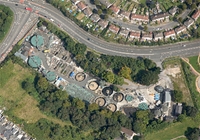Improvements planned for Camels Head
18th December 2014

Proposed improvements to Camels Head Sewage Treatment Works in Plymouth have been given the thumbs up by the water industry regulator.
The significant investment proposed for Camels Head in South West Water's business plan for 2015-20 received final approval from Ofwat on 12 December. Work is planned to start in 2015.
Camels Head has a history of odour-related problems. While the situation has significantly improved in recent years following investment, detailed investigations and proactive odour control measures, it is South West Water's intention to replace the site's primary settlement tanks.
The tanks are part of the original treatment process and are now nearly 80 years old. They are challenging to operate and keep clean, as well as having a large surface area, all of which can contribute to odour issues.
Four detailed options for the site are being considered including both conventional and novel process technologies.
South West Water's Head of Waste Water, Richard Gilpin, said: "This project presents some challenges because the existing site is surrounded on all sides and is fully developed within its boundaries, so there are no free areas available for further construction.
"Our scoping team have been hard at work looking at all the viable options for the space available, currently occupied by the primary settlement tanks.
"We are confident that all of the options will substantially reduce the risk of odour from Camels Head, and it is important that we make the right decision for the site. There is more analysis to do but we expect to have a preferred option early next year, with a view to starting work later in the year.
"We've been talking to Plymouth City Council, local residents and the city's MPs about our plans and we will be keeping them updated on our progress."
Notes to editors
- The four options being considered are:
a) Replacing the existing primary settlement tanks with four modern tanks, built on the same footprint
b) Replacing the primary settlement tanks with new 'primary filtration' technology
c) Bypassing the primary treatment stage altogether and installing additional aeration tanks as part of the secondary treatment stage instead
d) Similar to option C but using a more novel method known as 'moving bed bio reactor' as part of the secondary treatment stage.
- Costs for each option are still being developed, but are likely to be in the £millions
- Between 2015 and 2020, South West Water will spend about £1billion on improving the region's water and wastewater services while pegging average bill rises to 7% below inflation
- This follows a 7% bill reduction last year and a price freeze this year, to April 2015.
- Other highlights of South West Water's 2015-20 business plan include:
- Innovative ways to reduce the risk of sewer flooding and pollution
- Increased protection for bathing water and shellfish water quality
- New technologies to maintain high quality drinking water, including a new water treatment works north of Plymouth
- Expansion of the company's renewable energy programme
- Continuing support for those who struggle to pay their bills, working with Citizens Advice Bureau and other partners
- Boosting the regional economy through jobs, the use of local contractors and an expanded apprenticeship programme
- Sharing the rewards of out-performing its plan with customers in a new, transparent way. This will be monitored by an independent 'WaterShare' panel
Published: 18 December 2014
For further information please contact:
Press Office
South West Water
www.southwestwater.co.uk/contactus
